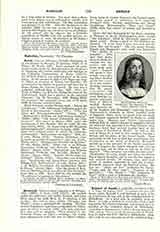

Rainald of Dassel b. probably not before 1115; d. in Italy, August 14, 1167. A younger son of a rich Saxon count, Rainald I, and destined as such to be an ecclesiastic, he was sent to the cathedral school at Hildesheim. At a later date he probably went to Paris. As early as 1130 he is said to have had a high reputation for classical learning, and to have been a member of the cathedral chapter of Hildesheim. According to documentary evidence he was provost in 1148, and in 1154 received the provostship of Petersberg at Goslar and of St. Moritz at Hildesheim. Soon after 1154 he was also provost of the cathedral chapter at Munster, but declined the See of Hildesheim. As a member of the embassy sent by Frederick I in 1153 to Eugenius III at Rome he first revealed his political ability, and in 1156 the emperor appointed him chancellor of the empire. The Diet of Besancon (October, 1157) left no doubt as to the drift of his policy. He inaugurated a German policy which insisted upon the rights and the power of the German kings, the strengthening of the Church in the German Empire, the lordship of Italy, and the humiliation of the papacy. Full of life, at times rough and blunt and again careful and calculating, Rainald, who, in spite of his ecclesiastical dignities, knew how to wield the sword, henceforth, influenced the policy of his imperial masters. Though he did not wish to separate Germany entirely from Rome and still held the medieval respect for the Church, his temperament carried Barbarossa much further than the latter desired, or than was advantageous under the circumstances. When Frederick finally submitted, it was Rainald who prevented him from making concessions which might have proved of advantage. The struggle with the curia began at the Diet of Besancon where Rainald vigorously rejected the use of the word beneficium, which might mean fief as well as benefit. In the expression used, that the pope would have been glad to grant the emperor even greater beneficia (or benefits), it was thought that the old desire of the curia for the mastery of the world was to be found. In 1158 Rainald undertook a diplomatic journey into Italy to prepare the way for the emperor. In 1159 he was appointed Archbishop of Cologne, and during the schism between Alexander III and Victor IV supported the imperial pope. In 1160 he was the ambassador of the emperor to the courts of the French and English kings, whom he endeavored to, win to the side of the antipope, but he did not succeed. In 1161 he joined the emperor before Milan and influenced him to consent to the destruction of the city. Rainald was also employed in diplomatic negotiations with Genoa, Pisa, and Louis VII; these, however, failed. In 1163 Alexander III excommunicated Rainald, who had loudly proclaimed in these negotiations the right of the emperor to dispose of the papal see. Basing his action on the Roncalian decrees, Rainald was once more successfully employed in Italy in the affairs of the emperor. When Victor IV died, Rainald, of his own volition and without waiting for the consent of the emperor, elected at Lucca a new antipope, Paschal III. Frederick would hardly have continued the schism. Rainald knew this and therefore wished to force the emperor to continue the struggle for imperial supremacy. In 1164 he was again in Germany, and brought the bones of the Three Kings with him. In the meantime the number of the adherents of the lawful pope increased in Germany. Finally only Rainald supported the antipope. Rainald won the consent of the King of England to common ecclesiastico-political action in behalf of Paschal and once more took up arms in defense of his one ambition, which he hoped the proposed canonization of Charlemagne at Aachen in 1165 would advance. In 1166 he was again in Italy, actively engaged in preparing the way for the emperor. While there with a few mounted soldiers he defended himself in Tusculum against a much larger force of Roman troops. His death was caused by the pest; he was buried in the Lady Chapel of the cathedral at Cologne.
F. KAMPERS

